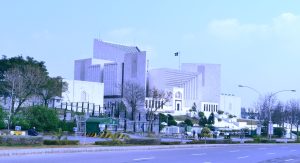Recent rulings by the Pakistan Supreme Court have thrust it into the middle of the ongoing political crisis in the country. These decisions, often made by partisan judges, are eroding the stature of and public confidence in Pakistan’s judiciary.
For over a year now, Pakistan’s political parties have been wrangling over the holding of elections. Pakistan Tehreek-e-Insaf (PTI) chief and former Prime Minister Imran Khan has been pushing for elections to the National Assembly (NA) to be advanced and for the Punjab and Khyber Pakhtunkhwa provincial assembly elections to be held before general elections. The Pakistan Muslim League-Nawaz (PML-N)- led government prefers the elections to be held at the same time. Elections to the NA are due later this year.
Amid this political wrangling, Chief Justice Umar Ata Bandial has come under scrutiny for his suo motu action on the Punjab assembly elections. Earlier this month, a three-member bench led by Bandial fixed May 14 as the new date for elections to the Punjab assembly. In doing so, he quashed a decision by the Election Commission of Pakistan (ECP) to defer polls in the province from April 10 to October 8.
This Supreme Court ruling is a major setback to the Shehbaz Sharif government, which has been trying to defer elections to the Punjab assembly, which was dissolved on January 13. The ruling PML-N-Pakistan People’s Party alliance is opposed to holding assembly elections in Punjab ahead of national elections.
As per the rules, elections are to be held under a caretaker government. With an elected government in place in Punjab, especially should that be led by the opposition PTI, the chances of victory for the ruling combine in Pakistan’s most populous and electorally crucial province in the general election could be undermined.
Sharif’s government has openly objected to the Supreme Court order to hold assembly elections in Punjab on May 14, saying that this is meant to facilitate victory by the PTI. The PTI, which enjoys immense popularity in Pakistan, believes it can win the upcoming election in Punjab, which will give it an upper hand administratively in the province when the NA elections take place subsequently across Pakistan.
Chief Justice Bandial’s authority and neutrality have been further eroded following revelations that the Supreme Court judges objected to the initiation of proceedings under Article 184(3) of the Constitution on the PTI’s petition regarding polls in Punjab.
When Bandial ruled in favor of early elections in Punjab, a number of top judges ruled that PTI’s suo motu request was dismissed on the ground of maintainability. The objection from the judges was based on their understanding that such action should not be taken without consulting all members of the court, and that the issue was pending in provincial courts and didn’t qualify as an issue of public interest.
The ruling coalition is in no mood to implement the top court’s rulings, which it believes may undermine its electoral prospects in the upcoming general elections.
Meanwhile, the ECP has complained that its constitutional authority has been undermined by the Supreme Court as the latter issued a date for Punjab assembly elections without its consent.
To find a way out of the situation, the parliament has tried to enact legislation to curtail the powers of the Chief Justice of Pakistan (CJP) with regard to unilaterally taking suo motu actions. However, earlier this month Bandial ruled that the bill curtailing the CJP’s powers will remain ineffective even if it becomes law. The ruling virtually undermines the legislature’s ability to do its work.
The situation has gotten to a point where the state seems to be in a revolt against the top judge’s orders over the elections. The State Bank of Pakistan has refused to obey the chief justice’s order to directly allocate funds to the ECP without the parliament’s approval. The Defense Ministry has made it clear that it cannot allocate security personnel as they are busy with military operations across the country. Meanwhile, the government has refused to enter into negotiations with PTI leadership under pressure from the Supreme Court.
This is not the first time that the apex court’s chief justices have tried to intervene in matters that are beyond their remit, undermining the judiciary’s legitimacy and harming Pakistan’s interests at home and abroad.
Rulings by Supreme Court judges have in fact left Pakistan weaker and caused trouble for policymakers and concerns for international investors. One of the most notable examples in this regard is the verdict handed out by former Chief Justice Iftikhar Chaudhary in the Reko Diq deal in 2013. The ruling damaged Pakistan’s reputation among investors and cost it financially too.
During his term at the helm, Chief Justice Saqib Nisar gave several controversial verdicts that were beyond his constitutional authority. Not only was Nisar behind the scandalous initiative of establishing a fund to collect donations for the construction of a dam but also, he repeatedly interfered in daily administrative affairs by using suo motu authority of his office to an unprecedented extent.
The Supreme Court is tasked with providing a fair and impartial interpretation of the law. However, its recent decisions have created an atmosphere of uncertainty in the country as citizens are unsure of how these decisions will be implemented. It is now up to the Supreme Court to prove that it can remain impartial and make decisions as per the Constitution rather than politics. Only then can it restore public trust in the judiciary and prevent further damage to the institution and the country.

































